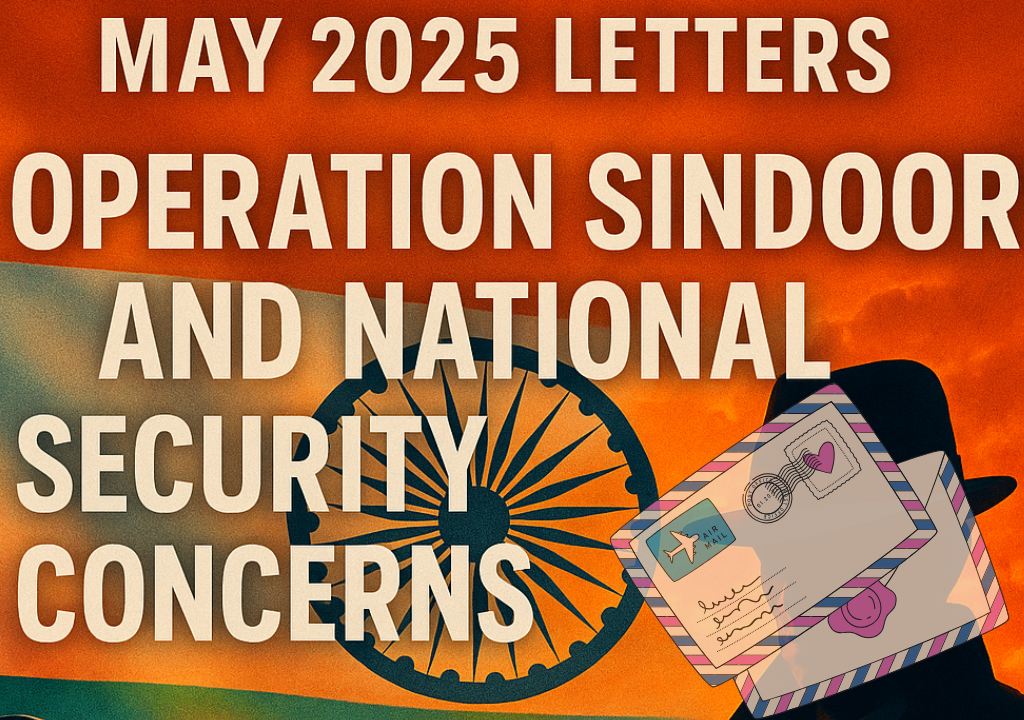May 2025 Letters: Operation Sindoor and National Security Concerns showcases four insightful reader perspectives on India’s precision strikes against Lashkar-e-Taiba and Jaish-e-Mohammed camps. Operation Sindoor, launched on May 7, 2025, aimed to disrupt terrorist networks and reinforce deterrence along the Line of Control. These letters critically assess whether such cross-border action was a justified act of self-defence or a risky escalation that could undermine regional stability. Contributors examine compliance with international law, potential humanitarian fallout, and the merits of diplomatic alternatives. As India balances the imperative of protecting civilian lives with maintaining its global reputation, these voices offer diverse viewpoints on how best to safeguard national security without compromising human rights or long-term peace prospects.
Operation Sindoor: A Necessary Deterrent for National Security
Operation Sindoor was a decisive action to degrade terrorist infrastructure in Pakistan-administered Kashmir. By targeting Lashkar-e-Taiba and Jaish-e-Mohammed training camps, India sent a clear message that cross-border terrorism will not be tolerated. This operation reinforces deterrence along the Line of Control and boosts morale among security personnel. Maintaining vigilance and readiness is essential, but so is measured retaliation when our citizens’ lives are at stake.
Yours faithfully,
Neeraj Sharma
Operation Sindoor: Upholding India’s Right to Self-Defence
Operation Sindoor demonstrated India’s resolve to protect its citizens against cross-border terrorism. By striking Lashkar-e-Taiba and Jaish-e-Mohammed training camps, India sent a clear message that any assault on innocent pilgrims will meet an immediate and proportionate response. Precision-guided munitions and real-time intelligence ensured that only confirmed terror installations were targeted, minimizing collateral damage.
This operation reinforced deterrence along the Line of Control, reminding terror groups that India will not hesitate to act when its sovereignty and civilian lives are threatened. As recent security lapses had emboldened militant outfits, a decisive military response was necessary to restore strategic balance and safeguard national security. India’s forces have demonstrated restraint and professionalism, adhering to international norms while executing a surgical strike that prioritizes civilian safety.
Yours faithfully,
Deepak Verma
Operation Sindoor: Strategic Deterrence through Measured Action
In the wake of the February attack on pilgrims in Pahalgam, India lacked room for diplomatic dithering. Operation Sindoor showcased a calibrated use of force designed to dismantle terror infrastructure without provoking a full-scale conflict. By relying on accurate intelligence and advanced precision weapons, India struck only those sites directly linked to cross-border attacks, ensuring military necessity while limiting civilian risk.
This measured approach strengthened India’s deterrence posture. Terror networks thrive on perceived impunity; by demonstrating a capability and willingness to strike beyond its borders, India forced militant groups to reconsider future plans. Moreover, the operation sent a clear diplomatic signal: India will pursue terrorists wherever they hide, compelling Islamabad to take concrete action against safe havens. In a region fraught with volatility, such firmness was long overdue.
Sincerely,
Anjali Mehta
Operation Sindoor: Defending Civilian Lives and National Integrity
The primary objective of Operation Sindoor was to break the cycle of violence that has repeatedly targeted Indian civilians. By neutralizing key training camps in Pakistan-administered Kashmir, India disrupted terror pipelines responsible for planning attacks on soft targets. The operation underscored India’s commitment to defending its non-combatant population and prevented further loss of life.
Far from being reckless escalation, Operation Sindoor was a proportionate response rooted in both moral and strategic imperatives. International law recognizes a nation’s right to self-defence when its people face imminent threat. India’s restraint—limiting strikes to verified terror nodes—demonstrated respect for sovereignty while prioritizing human security. The message was clear: no act of terror against India will go unanswered.
Yours sincerely,
Rajesh Kulkarni
Conclusion
Taken together, these letters highlight Operation Sindoor as a justified and necessary act of self-defence. By employing precision-guided strikes against confirmed terrorist infrastructure, India upheld its sovereign right to protect civilian lives while minimizing collateral harm. The operation not only degraded Lashkar-e-Taiba and Jaish-e-Mohammed capabilities but also restored deterrence along the Line of Control. In an environment where diplomatic measures alone had failed to curb militant attacks, decisive military action was indispensable. Operation Sindoor reaffirmed that India will neither tolerate terrorism nor compromise its national security, sending a firm message to both hostile entities and international observers that civilian protection and strategic stability remain paramount.

